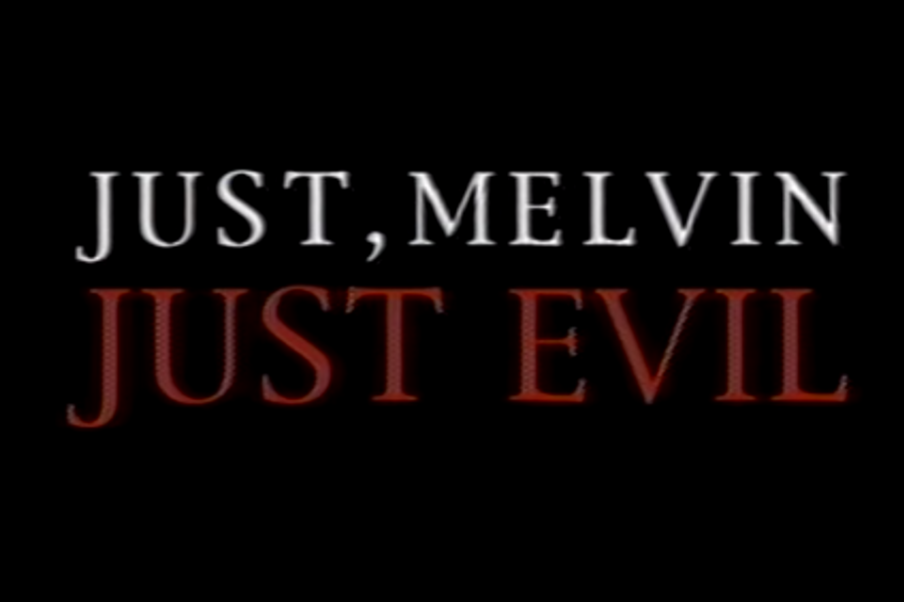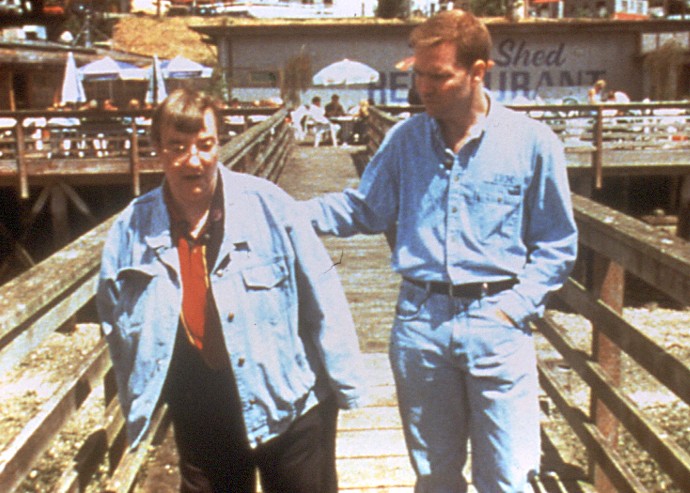
An American documentary by James R. Whitney about his grandfather, Melvin Just, and the devastating consequences of the sexual abuse he inflicted on his family.
 |
| (Scroll to bottom to watch the full documentary) |
Roger Ebert said the film was "one of the most powerful documentaries I've seen" and
"Just, Melvin," is a portrait of a family that still has open wounds and deep psychic scars after decades of abuse. The title refers to Melvin Just, who as a husband, father, stepfather and grandfather repeatedly committed incest and abuse against almost everyone in his family. Two of his stepdaughters were witnesses when he strangled a visiting nurse, a crime for which he was never tried. The survivors to this day are in a state of shock, which the camera plainly shows: Some live in campers or vans, and alcoholism and prostitution are symptoms.
The film was made by James Ronald Whitney, one of Melvin's grandsons, with the support of his mother, Ann Marie. It is not the first documentary about family abuse, but it is probably the most painful. It isn't uncommon to hear abuse or incest victims share their memories, but "Just, Melvin" does the unimaginable and shows the evil old man being confronted by the accusations, first in an extraordinary meeting with James, later in a family visit to his hospital room.
Whitney said after the screening that he had escaped the fate of other family members because of the strength of his mother, a woman who once tried to shoot Melvin, and who, strong and intelligent, steered him away from drugs and trouble and into show business (we see him as a winning dancer on "Star Search").
His film is not only devastating but subtle in its artistry, with great attention to a soundtrack that suggests the echoes of long-ago words of hate and current painful memories. Nothing in the film quite prepares us for the closing scenes at a burial service, where a pastor reads futile words of comfort while drunken family members alternate between grief and rage."
Geoffrey Gilmore:
"There are few subjects as abhorrent to our sensibilities as incest, particularly when it involves very young children, and Just, Melvin chronicles a truly monstrous case. The film tells the story of an individual whose path of destruction was so insidious and devastating that it's almost impossible not to be provoked to feelings as varied as sympathy, rage, and disgust. That this is not an account by an outsider but the story of a survivor makes it all the more remarkable and significant, but not any easier to digest.
James Ronald Whitney is the grandson of Melvin Just. His mother was abused and molested from a very early age, as were all her sisters and step- sisters. And as we consequently discover, the same is true of all the women in Melvin Just's second marriage. This litany of violation and mistreatment is especially disturbing because the film has an odd, almost-matter-of-fact tone. There is no need for dramatic histrionics. The reality of these confessions makes us witnesses to violence that is frighteningly genuine. The confessions themselves were perhaps triggered by the reopening of a case involving the killing of a social worker, a murder that undoubtedly was the act of Whitney's grandfather.
The fact that the filmmaker himself was also the subject of abuse and managed to 'escape' his madly dysfunctional upbringing just adds to the many elements that make this film so intriguing. But Just, Melvin is a story that will never have a happy ending, a chilling and candid portrait of the cycles and consequences of abuse."
As the grandson of Melvin Just, Whitney delves through his horrific ancestry while delivering what feels like scripted monologues, often while playing a grand piano. Even though the film’s theme is nothing short of ghastly, the director takes intermittent breaks from the family’s story to dwell on his quasi-successful past as a Star Search contestant, dancer, college cheerleader, pianist, and martial artist.
(It may be insensitive, but these sequences leave the viewer with the same creepy feelings one derives from Herzog documentaries.)
Like proposing marriage during a funeral, Whitney's inability to resist indulging in the spotlight, especially in such an odious context, is unfortunate. Even so, his encapsulation of the events is exceptionally effective.
Whitney’s disquieting moments of self-promotion sit in stark contrast with the surreal story of Melvin Just and his victims. The ancestral tree is rotten with child molestation, suicide attempts, incest, and substance abuse. The majority of women in Just’s two families recount numerous acts of abuse from infancy to their teenage years. As Melvin remarries, each time into a family ripe with young, pre-existing daughters, the list of abominations grows longer.

Additionally, though it’s less highlighted in the film, many of the male members in the family describe being assaulted as well, or witnessing abuse at one point or another. Eerily enough, though not including the very brief and ambiguous confession of Whitney’s own experience, the men in film seem so thoroughly steeped in denial, and/or conditioned acceptance, that not only do they not recognize any apparent problem, they seem to be continuing in the hideous tradition: An effort which seems likely to produce many more generations crippled by life altering trauma.
The account of this family’s grievous past, accompanied by its seemingly inherent and infectious proclivity for tolerated sexual abuse, is really nothing short of stomach turning. Regardless of the director’s method, the creation of this film and the story being told is undeniably important. The sequences where Whitney speaks with his mother, Ann, as well as his aunts, are tangibly therapeutic, and – in an almost invasive way – touching. Whitney’s narration is not always the most irritating thing ever heard and, while I’m not a big fan of a documentary filmmaker's forced inclusion of themselves so deeply in their film, his declaration that he will not stop until Just is either dead or in prison – not to mention his one-on-one confrontations with Melvin during filming – create an interesting dynamic that promoted a sense of urgency.
Experiencing the admissions of these women and men and the sense of acceptance they share is uniquely unnerving. The lasting affects drove nearly every single entity of the bloodline into dire circumstances, immersed in substance abuse, physical abuse, and homelessness. (Many of the director’s aunts, in fact, lived in stalled cars, alongside current boyfriends, dogs, and cats.)
Above all, there is absolutely no attempt at providing an unbiased account of the acts committed, nor should there be. Just, Melvin: Just Evil is not a picture-perfect documentary. Its occasionally uneasy juxtaposition between child molestation and how well director Whitney can do the splits doesn’t make for the easiest ride down an already uncomfortable road. Nevertheless, the overall effect is heartbreaking, virtually unimaginable, and pretty fuckin' disturbing...
Five Random Facts About "Just, Melvin":
- This all happened in Northern California.
- Melvin Just died before the film was completed, and was never convicted for the murder of the county nurse.
- Grandma Fay was a collector of her “suitors'” underwear and he also won a pissing competition once against four guys. (don't ask)
- Whitney’s dad, estranged for decades, left Ann and James to join the Hell’s Angels when James was 9 years old.

- Because this family makes The Wild and Wonderful Whites of West Virginia look like My 2 Dads, here’s the family tree:



